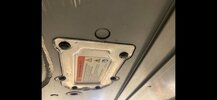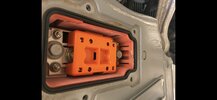My 2017 Model S 100D with 40,000 miles suddenly started flashing warnings last week and had towed to Tesla Service Center. Diagnosis was battery failure due to water seepage under a fuse cover which Tesla attributes to an impact to this fuse cover which cracked the plastic below. While there are some minor scrapes near this cover there is no damage to this thin cover itself. Given all the past discussion on the ballistic plate that protects this battery, could Tesla have possibly left an exposed Achilles heel with only this thin cover on top of plastic as the only thing preventing catastrophic damage to a $25K battery.
Further, the Service Center had never seen this issue before and I can find no other reports of this failure. Tesla says it’s “collision damage“ that broke a piece of plastic which destroyed my battery. My insurer will cover, but is calling an “at fault” accident due to me not avoiding whatever caused the plastic to break even though there is no visible damage to the cover itself. I have no recollection of hitting anything! Has anyone ever heard of this issue before?
Further, the Service Center had never seen this issue before and I can find no other reports of this failure. Tesla says it’s “collision damage“ that broke a piece of plastic which destroyed my battery. My insurer will cover, but is calling an “at fault” accident due to me not avoiding whatever caused the plastic to break even though there is no visible damage to the cover itself. I have no recollection of hitting anything! Has anyone ever heard of this issue before?




